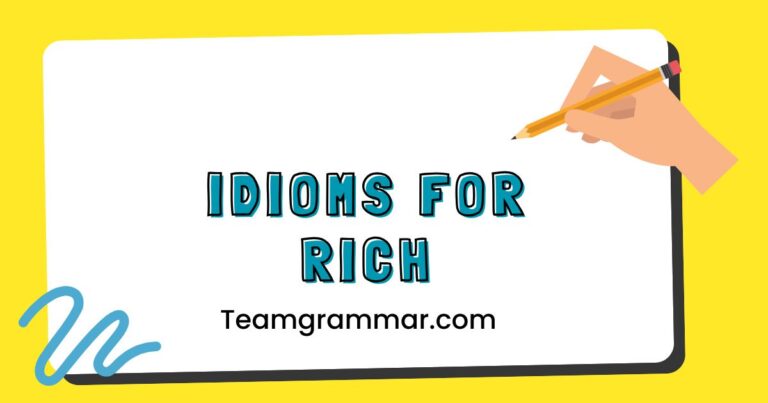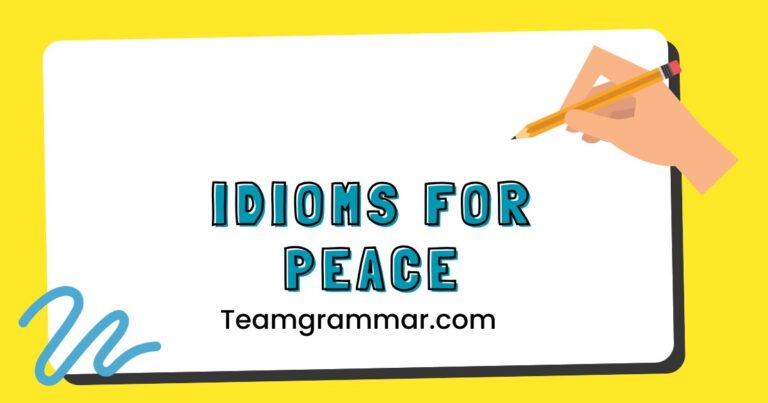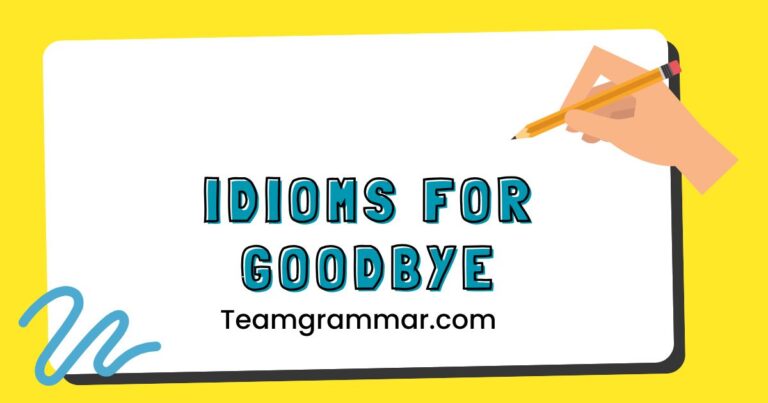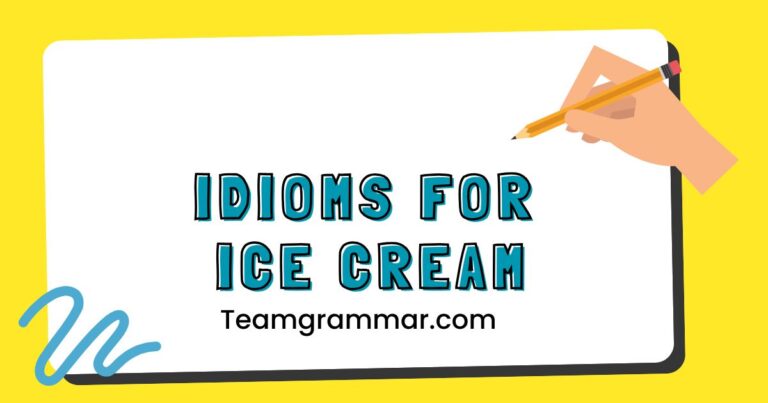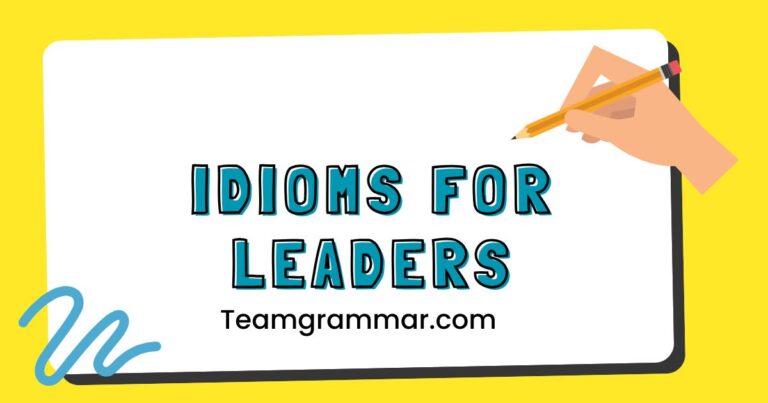41 Idioms for Perfect: Mastering Flawless English Expressions
Idioms add color and depth to the English language, making it more expressive and engaging. Mastering idioms related to the concept of “perfect” allows you to communicate nuanced meanings beyond literal interpretations.
This article explores a variety of idioms that convey the idea of perfection, excellence, or flawlessness. Whether you’re an English language learner or a native speaker aiming to refine your vocabulary, understanding these idioms will enhance your communication skills and help you appreciate the richness of the language.
This guide is suitable for intermediate to advanced English learners, teachers, and anyone interested in mastering idiomatic expressions.
Table of Contents
- Introduction
- Definition of Idioms for Perfect
- Structural Breakdown of Idioms
- Types and Categories of Idioms for Perfect
- Idioms for Flawless Execution
- Idioms for an Ideal State
- Idioms for Complete Success
- Idioms for Absolute Agreement
- Examples of Idioms for Perfect
- Flawless Execution Examples
- Ideal State Examples
- Complete Success Examples
- Absolute Agreement Examples
- Usage Rules for Idioms
- Common Mistakes with Idioms
- Practice Exercises
- Exercise 1: Fill in the Blanks
- Exercise 2: Matching Idioms to Meanings
- Exercise 3: Sentence Completion
- Advanced Topics in Idiomatic Usage
- Frequently Asked Questions
- Conclusion
Definition of Idioms for Perfect
An idiom is a phrase or expression whose meaning cannot be understood from the literal meanings of the individual words. Instead, idioms have a figurative meaning that is culturally specific.
Idioms for “perfect” are phrases that describe a state of flawlessness, excellence, or ideal completion. These idioms are used to emphasize that something has been done exceptionally well or has reached the highest possible standard.
They add color and vibrancy to language, making communication more effective and engaging.
Idioms often function as adverbs or adjectives, modifying verbs, nouns, or entire sentences to convey the degree of perfection. They are commonly used in everyday conversation, literature, and formal writing, although the appropriateness of their use depends on the context.
Understanding idioms requires cultural awareness and a good grasp of the English language, as misinterpreting them can lead to misunderstandings. They are classified based on their function and the specific nuance they add to the idea of perfection.
The context in which an idiom is used is crucial for its correct interpretation. For example, the phrase “hit the nail on the head” means to do something exactly right, but its literal interpretation is completely different.
Similarly, “a perfect storm” refers to a combination of events that result in an extremely bad situation, not necessarily something “perfect” in the positive sense. Therefore, learners must pay attention to the surrounding words and the overall situation to grasp the intended meaning.
Structural Breakdown of Idioms
Idioms, unlike regular phrases, resist direct structural analysis. Their meaning is not derived from the sum of their parts but rather from their established, conventional usage.
Understanding the structure of idioms involves recognizing common patterns and how they deviate from literal language.
Many idioms consist of a verb and a prepositional phrase, such as “nail it” (to succeed perfectly) or “get it right.” Others involve metaphorical comparisons, like “fit like a glove” (to be a perfect fit). Some idioms use similes, employing “like” or “as,” for example, “as good as gold” (perfectly behaved).
Recognizing these structural elements can aid in memorizing and understanding idioms, even if their literal meanings seem nonsensical.
The grammatical role of an idiom in a sentence can vary. Some idioms function as adjectives, describing a noun (e.g., “a textbook example”).
Others act as adverbs, modifying a verb (e.g., “executed flawlessly”). Still others can function as entire sentences, conveying a complete thought (e.g., “spot on!”).
Identifying the grammatical function helps in correctly placing the idiom within a sentence and ensures proper usage.
Types and Categories of Idioms for Perfect
Idioms for “perfect” can be categorized based on the specific aspect of perfection they describe. Here are some common categories:
Idioms for Flawless Execution
These idioms describe situations where something is done perfectly, without any errors or mistakes. They emphasize the skill and precision involved in achieving perfection.
Idioms for an Ideal State
These idioms refer to situations or conditions that are perfectly suited or optimized. They highlight the suitability and harmonious nature of something.
Idioms for Complete Success
These idioms denote situations where a goal is achieved completely and successfully. They emphasize the positive outcome and the absence of any shortcomings.
Idioms for Absolute Agreement
These idioms express complete and total agreement or understanding. They emphasize the harmony and unity of opinions or viewpoints.
Examples of Idioms for Perfect
Below are examples of idioms for “perfect,” categorized by the type of perfection they represent. Each category includes a table with examples, their meanings, and example sentences to illustrate their usage.
Flawless Execution Examples
These idioms describe situations where something is done perfectly, without any errors or mistakes. They emphasize the skill and precision involved in achieving perfection.
The table below illustrates several such idioms.
| Idiom | Meaning | Example Sentence |
|---|---|---|
| Nail it | To do something perfectly or successfully. | She was nervous about the presentation, but she nailed it. |
| Hit the nail on the head | To describe exactly what is causing a situation or problem. | You’ve hit the nail on the head with that suggestion; it’s exactly what we need. |
| Get it right | To do something correctly. | After several attempts, he finally got it right. |
| Down to a T | Perfectly; exactly. | The instructions were followed down to a T. |
| Like clockwork | Operating smoothly and predictably. | The project went like clockwork from start to finish. |
| Run like a well-oiled machine | To operate very smoothly and efficiently. | The company runs like a well-oiled machine, thanks to the efficient management. |
| On point | Perfectly accurate or appropriate. | Her analysis of the situation was on point. |
| Spot on | Exactly right; perfectly accurate. | His assessment of the market trends was spot on. |
| Without a hitch | Without any problems or difficulties. | The event went off without a hitch. |
| Smooth sailing | Easy progress without difficulties. | Once we got past the initial challenges, it was smooth sailing. |
| Acing it | To get a very high grade in an exam or test; to do something very well. | She was worried about the exam, but she ended up acing it. |
| Nailed down | To succeed in achieving or obtaining something definite. | We finally nailed down the contract after weeks of negotiations. |
| Executed flawlessly | Performed perfectly, without any mistakes. | The plan was executed flawlessly, resulting in a successful outcome. |
| Pull it off | To succeed in doing something difficult. | Despite the challenges, they managed to pull it off. |
| To perfection | To the highest possible standard. | The chef cooked the steak to perfection. |
| Right on the money | Exactly right; accurate. | His prediction about the stock market was right on the money. |
| Down pat | Completely mastered; perfectly learned. | She had the dance routine down pat after weeks of practice. |
| Like a charm | Very effectively or successfully. | The new software worked like a charm, solving all our problems. |
| Without a flaw | Perfect, without any mistakes. | The performance was without a flaw, earning the actors a standing ovation. |
| Mastered completely | Having a complete understanding and skill in something. | He had mastered completely the art of negotiation. |
| Got it down cold | To have learned something so well that you can repeat it perfectly. | She got it down cold the lines for her play. |
| In tip-top shape | In excellent condition. | The car is in tip-top shape after the mechanic fixed it. |
| Acing the test | To get a perfect score on a test. | She was so prepared that she ended up acing the test. |
| Absolutely nailed it | To do something extremely well, perfectly. | She absolutely nailed it during her presentation. |
Ideal State Examples
These idioms refer to situations or conditions that are perfectly suited or optimized. They highlight the suitability and harmonious nature of something.
The table below illustrates several such idioms.
| Idiom | Meaning | Example Sentence |
|---|---|---|
| Fit like a glove | To be a perfect fit. | The dress fits like a glove. |
| A match made in heaven | A perfect combination or partnership. | Their collaboration was a match made in heaven. |
| The perfect storm | A combination of events that result in an extremely bad situation. | The company faced the perfect storm of economic downturn and increased competition. |
| Right up your alley | Perfectly suited to one’s tastes or abilities. | This project is right up your alley; you’re the perfect person for it. |
| A perfect fit | Ideal or exactly right for a particular purpose or person. | He’s a perfect fit for the team. |
| Made to order | Perfectly suited or adapted to a specific need or purpose. | The solution was made to order for our specific problem. |
| In the zone | In a state of optimal performance. | When she’s in the zone, she can solve any problem. |
| Just the ticket | Exactly what is needed or wanted. | This vacation is just the ticket after a long and stressful year. |
| A dream come true | An aspiration that has been realized. | Opening her own bakery was a dream come true for her. |
| Picture perfect | Beautiful and flawless, like a perfect photograph. | The scenery was picture perfect. |
| As good as it gets | The best possible situation. | This is as good as it gets in terms of job satisfaction. |
| The cream of the crop | The best of a particular group. | These students are the cream of the crop. |
| At its finest | At its best or most excellent. | The art exhibit showcased the artist at its finest. |
| In its prime | At the best stage of development. | The athlete was in its prime during the Olympics. |
| In full bloom | At the peak of beauty or development. | The garden was in full bloom during the spring. |
| A stroke of genius | A brilliant idea. | Hiring her was a stroke of genius. |
| The best of both worlds | A situation where you can enjoy the advantages of two different things at the same time. | Working from home gives me the best of both worlds. |
| A perfect scenario | An ideal situation. | This is a perfect scenario for starting a new business. |
| Like a hand in a glove | To be a perfect fit. | They work together like a hand in a glove. |
| A seamless fit | A perfect integration without any difficulties. | The new software provides a seamless fit with our existing systems. |
| A marriage made in heaven | A relationship or partnership that is perfectly suited and harmonious. | Their partnership is a marriage made in heaven, as they complement each other perfectly. |
| In perfect harmony | Existing together in a pleasing or balanced way. | The orchestra played in perfect harmony. |
| A textbook case | A classic example that illustrates a particular principle or situation perfectly. | This situation is a textbook case of mismanagement. |
| On a silver platter | To be given something easily, without having to work for it. | He was offered the job on a silver platter. |
Complete Success Examples
These idioms denote situations where a goal is achieved completely and successfully. They emphasize the positive outcome and the absence of any shortcomings.
The table below illustrates several such idioms.
| Idiom | Meaning | Example Sentence |
|---|---|---|
| Home run | A complete success. | The new product launch was a home run. |
| Knock it out of the park | To do something exceptionally well. | She really knocked it out of the park with her performance. |
| A roaring success | A very successful event or undertaking. | The charity event was a roaring success. |
| A resounding success | A great success that is very clear and obvious. | The conference was a resounding success. |
| Hit the jackpot | To have a great success or stroke of good luck. | They hit the jackpot with their new invention. |
| Went off without a hitch | Proceeded perfectly, without any problems. | The wedding went off without a hitch. |
| Topped off | Finished or completed perfectly. | The evening was topped off with a delicious dessert. |
| Complete triumph | A total victory or success. | The play was a complete triumph. |
| Out of the woods | Out of danger or difficulty. | The company is finally out of the woods after the financial crisis. |
| Full marks | The highest possible score or grade. | He deserves full marks for his effort. |
| Nailed the landing | To achieve a perfect conclusion or result. | She nailed the landing in her presentation. |
| Absolute victory | A complete and undeniable win. | The team achieved an absolute victory. |
| All systems go | Everything is ready and in perfect working order. | All systems go for the launch tomorrow. |
| A smashing success | A very great success. | The party was a smashing success. |
| A grand slam | A major success. | Their new product was a grand slam. |
| Crowned with success | To achieve a high level of success. | His efforts were crowned with success. |
| A sweeping success | A widespread and significant success. | The reforms have been a sweeping success. |
| A runaway success | A very successful product or business. | The book became a runaway success. |
| A complete knockout | Something or someone that is extremely attractive or successful. | Her performance was a complete knockout. |
| A sure thing | Something certain to succeed. | This investment is a sure thing. |
| Went off swimmingly | To proceed very well without any problems. | The event went off swimmingly. |
| A perfect ten | A perfect score. | Her performance was a perfect ten. |
| Brought home the bacon | To earn a living or achieve success. | He brought home the bacon by winning the contract. |
| A field day | A situation in which someone has a lot of opportunities to do something. | The media had a field day with the scandal. |
Absolute Agreement Examples
These idioms express complete and total agreement or understanding. They emphasize the harmony and unity of opinions or viewpoints.
The table below illustrates several such idioms.
| Idiom | Meaning | Example Sentence |
|---|---|---|
| On the same page | In agreement or understanding. | We need to make sure we’re on the same page before we proceed. |
| See eye to eye | To agree fully. | They don’t always see eye to eye on political issues. |
| Of one mind | In complete agreement. | The committee was of one mind on the decision. |
| In unison | Acting or speaking together. | The choir sang in unison. |
| Sing from the same hymn sheet | To express the same opinions as other people because you have been told to. | The politicians are all singing from the same hymn sheet. |
| Speaking the same language | Having a shared understanding. | It’s important that the team is speaking the same language. |
| A meeting of minds | An agreement reached through discussion and compromise. | The negotiation resulted in a meeting of minds. |
| In complete accord | In total agreement. | The two leaders were in complete accord on the matter. |
| In full agreement | Completely agreeing with someone. | We are in full agreement with your proposal. |
| United front | A situation in which people are working together in agreement and determined to achieve something. | The employees presented a united front to the management. |
| Dovetail perfectly | To fit together well. | Their skills dovetail perfectly. |
| On the same wavelength | Thinking in a similar way. | They are always on the same wavelength. |
| Share the same vision | To have the same goals and objectives. | The two companies share the same vision for the future. |
| A consensus of opinion | A general agreement. | There was a consensus of opinion on the issue. |
| One voice | Speaking with a single, unified message. | The community spoke with one voice against the proposal. |
| On all counts | In every respect; completely. | The plan was successful on all counts. |
| In perfect alignment | In complete agreement and harmony. | Their goals are in perfect alignment. |
| Of the same opinion | Having the same view or belief. | They are of the same opinion regarding the matter. |
| A harmonious agreement | An agreement reached peacefully and amicably. | The negotiation ended in a harmonious agreement. |
| A unified stance | A common position or attitude. | The organization adopted a unified stance on the issue. |
| In total harmony | Perfectly in agreement or accord. | The team worked in total harmony. |
| A unanimous decision | A decision on which everyone agrees. | The board made a unanimous decision. |
| Sharing a common ground | Having similar interests or opinions. | They are sharing a common ground on the issue. |
| A collective understanding | A shared comprehension among a group of people. | There was a collective understanding of the project’s goals. |
Usage Rules for Idioms
Using idioms correctly requires understanding their specific meanings and contexts. Here are some key rules to follow:
- Context is crucial: Always consider the context in which you use an idiom. The same idiom can have different connotations depending on the situation.
- Audience awareness: Be mindful of your audience. Idioms may not be appropriate in formal settings or when communicating with non-native speakers.
- Figurative meaning: Remember that idioms have figurative meanings. Avoid interpreting them literally.
- Grammatical structure: Use idioms in their correct grammatical form. Changing the structure can alter the meaning or make the idiom nonsensical.
- Cultural sensitivity: Be aware of cultural differences. Some idioms may not translate well or may be offensive in other cultures.
Understanding the nuances of idioms is essential for effective communication. Overusing idioms can make your speech sound unnatural or forced.
Use them sparingly and appropriately to enhance your message.
Common Mistakes with Idioms
One of the most common mistakes is interpreting idioms literally, which leads to misunderstandings. Here are some examples of common errors:
| Incorrect | Correct | Explanation |
|---|---|---|
| She nailed the hammer on the head. | She hit the nail on the head. | “Hit the nail on the head” means to do something exactly right, not to physically hit a nail. |
| The dress fits like a hand. | The dress fits like a glove. | “Fit like a glove” means to be a perfect fit, not to resemble a hand. |
| They are in the same book. | They are on the same page. | “On the same page” means to be in agreement or understanding, not to be in the same book. |
| He knocked the park out of it. | He knocked it out of the park. | “Knock it out of the park” means to do something exceptionally well. |
Another common mistake is using idioms in inappropriate contexts. For example, using slang idioms in formal business communications can be unprofessional.
Practice Exercises
Test your understanding of idioms for “perfect” with these practice exercises.
Exercise 1: Fill in the Blanks
Fill in the blanks with the appropriate idiom from the list below.
Idiom List: nailed it, fit like a glove, on the same page, hit the jackpot, like clockwork
| Question | Answer |
|---|---|
| 1. The presentation was excellent; she really __________. | nailed it |
| 2. The new software __________ with our existing systems. | fit like a glove |
| 3. We need to make sure we’re __________ before we start the project. | on the same page |
| 4. They __________ with their new business venture. | hit the jackpot |
| 5. The project went __________ from start to finish. | like clockwork |
| 6. He __________ with his new business venture. | hit the jackpot |
| 7. The team has to be __________ to complete the mission. | on the same page |
| 8. The new manager __________ during the interview. | nailed it |
| 9. The new suit __________ on him. | fit like a glove |
| 10. The old machine worked __________. | like clockwork |
Exercise 2: Matching Idioms to Meanings
Match the idiom to its correct meaning.
| Idiom | Meaning |
|---|---|
| 1. Knock it out of the park | a. To be in complete agreement |
| 2. See eye to eye | b. To be perfectly suited to one’s tastes |
| 3. Right up your alley | c. To do something exceptionally well |
| 4. A perfect storm | d. A major success |
| 5. Home run | e. A combination of events resulting in an extremely bad situation |
Answers:
| Idiom | Meaning |
|---|---|
| 1. Knock it out of the park | c. To do something exceptionally well |
| 2. See eye to eye | a. To be in complete agreement |
| 3. Right up your alley | b. To be perfectly suited to one’s tastes |
| 4. A perfect storm | e. A combination of events resulting in an extremely bad situation |
| 5. Home run | d. A major success |
Exercise 3: Sentence Completion
Complete each sentence using the appropriate idiom from the list.
Idiom List: a dream come true, as good as it gets, the cream of the crop, without a hitch, full marks
| Question | Answer |
|---|---|
| 1. Opening her own bakery was __________. | a dream come true |
| 2. This is __________ in terms of job satisfaction. | as good as it gets |
| 3. These students are __________. | the cream of the crop |
| 4. The event went off __________. | without a hitch |
| 5. He deserves __________ for his effort. | full marks |
| 6. Realizing her potential was __________. | a dream come true |
| 7. The performance was __________. | as good as it gets |
| 8. These musicians are __________. | the cream of the crop |
| 9. The surgery went __________. | without a hitch |
| 10. She deserves __________ for her achievements. | full marks |
Advanced Topics in Idiomatic Usage
For advanced learners, it’s important to explore the origins and evolution of idioms. Many idioms have historical or cultural roots that provide deeper insights into their meanings.
For example, “hit the nail on the head” is believed to originate from carpentry, where hitting the nail correctly ensures the desired result.
Additionally, understanding the register and tone of idioms is crucial. Some idioms are informal and suitable for casual conversation, while others are more formal and appropriate for professional settings.
Using the wrong idiom in the wrong context can undermine your credibility.
Finally, pay attention to regional variations in idiomatic usage. Some idioms are specific to certain regions or countries, and using them in other areas may cause confusion or misunderstanding.
Always be mindful of your audience and adapt your language accordingly.
Frequently Asked Questions
- What is an idiom?
An idiom is a phrase or expression whose meaning cannot be understood from the literal meanings of the individual words. Instead, it has a figurative meaning that is culturally specific.
- Why is it important to learn idioms?
Learning idioms enhances your understanding of the English language, allows you to communicate more effectively, and helps you appreciate the richness and nuances of the language.
- How can I learn idioms effectively?
Read widely, listen to native speakers, use flashcards, and practice using idioms in your own speech and writing. Pay attention to the context in which idioms are used.
- Are idioms the same in all English-speaking countries?
No, idioms can vary significantly between different English-speaking countries. Some idioms are specific to certain regions or cultures.
- Can I use idioms in formal writing?
It depends on the idiom and the context. Some idioms are appropriate for formal writing, while others are more suitable for casual conversation. Choose idioms carefully and consider your audience.
- What should I do if I don’t understand an idiom?
Look it up in a dictionary or online resource. Pay attention to the context in which it is used and ask a native speaker for clarification if needed.
- How often should I use idioms in my speech?
Use idioms sparingly and appropriately. Overusing idioms can make your speech sound unnatural or forced. Focus on using them correctly and in the right context.
- Are there any resources to help me learn idioms?
Yes, there are many resources available, including dictionaries
- Are there any resources to help me learn idioms?
Yes, there are many resources available, including dictionaries, online guides, and language learning apps. Look for resources that provide clear definitions, example sentences, and cultural context.
- How do I avoid misusing idioms?
Pay close attention to the context in which you use idioms, and be mindful of your audience. If you are unsure about the meaning or appropriateness of an idiom, it’s best to avoid using it.
- What is the difference between idioms and slang?
Idioms are phrases with figurative meanings that are widely recognized and accepted, while slang consists of informal words and phrases that are typically used within specific social groups or subcultures. Slang is also more likely to be short-lived, while idioms are more established.
Conclusion
Mastering idioms for “perfect” is a valuable skill for anyone looking to enhance their English language proficiency. By understanding the meanings, structures, and usage rules of these idioms, you can communicate more effectively and appreciate the richness of the language.
Remember to practice regularly, pay attention to context, and be mindful of your audience. With dedication and perseverance, you can achieve perfection in your idiomatic usage and elevate your communication skills to new heights.
Whether you aim for flawless execution, an ideal state, complete success, or absolute agreement, the right idiom can help you express your thoughts with precision and flair.


